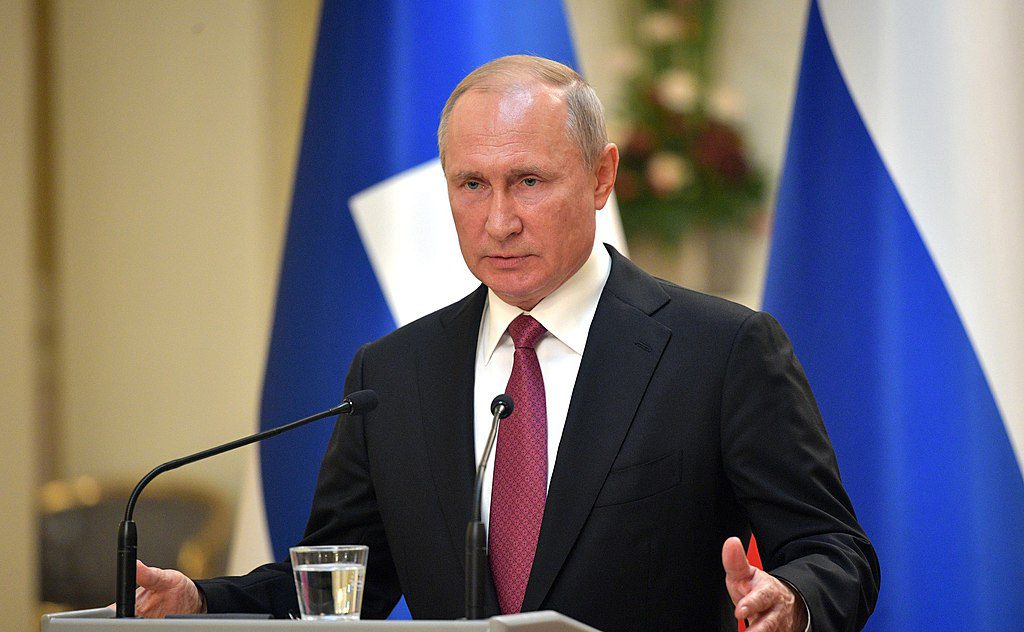
During a Russian state TV interview on Sunday—a full transcript of which, perhaps tellingly, has of yet not been made available—Russian President Vladimir Putin again emphasized his country’s position on the Ukraine debacle, AP reports.
Mounting tensions between East and West have been a fixture in news reporting for the past few weeks, with the U.S. and Ukraine claiming that Russia may be preparing an invasion of its neighbor. Russia has emphatically denied planning such a course of action and says it is Ukraine’s dalliance with NATO that is to be blamed for the escalation.
Ukraine has the third-largest military in Europe after Russia and France and poses no small military threat on its own. But admittance to NATO, or deployment of weapons provided by allies on its territory, is a red line for Moscow that “it wouldn’t allow the West to cross,” the Russian leader warned.
“What the U.S. is doing in Ukraine is at our doorstep… And they should understand that we have nowhere further to retreat to. Do they think we’ll just watch idly?” Putin said. Putin went on to predict that “they’ll put missile systems in Ukraine, 4-5 minutes flight time to Moscow. Where can we move? They have simply driven us to such a state that we have to tell them: ‘Stop.’”
When asked about a possible scenario where the West fails to meet these security guarantees, Putin explained that an array of options are open to him, adding that “it will depend on what proposals our military experts submit to me.” In an earlier statement however, the Russian President promised that Moscow will take “adequate retaliatory military-technical measures” and react “toughly to unfriendly steps.”
The gravity of the situation was again highlighted during Putin’s annual press conference on Thursday at which, when asked by a reporter, he spoke of it being “a serious matter,” speculating over what plans for infrastructure development, social policy, and healthcare mean “if we end up in the conflict you are asking about? This is not our choice, and we do not want this.” He went on to say that “ensuring security on this territory and in this area is one of the key matters on today’s agenda,” reminding his audience that “we spoke out clearly and directly against any further eastward expansion by NATO. The ball is in their court. They need to respond in one way or another.”
The issue of an expanding NATO, initially conceived and still promoted as a defensive alliance, has been a cause of worry and source of distrust to Russian leadership ever since the Soviet Empire’s final dissolution in 1991.
A 2017 online posting of 30 declassified documents, revealing that many Western leaders had made (if not formal) assurances to then President Mikhail Gorbachev that NATO would not expand, has only confirmed and indeed exacerbated that distrust. Among those leaders was U.S. Secretary of State James Baker, who made a commitment to Gorbachev that NATO would not expand beyond the borders of a reunified Germany following East Germany’s annexation. In subsequent decades however, the Western bloc has incorporated every former member of the Warsaw Pact, and seven republics of the former USSR and Yugoslavia.
This historical and continuing grievance Putin has amply referred to before, but still remains largely unmentioned by Western media. Using more strident language than usual, Putin made another reference to it during his press conference, when he replied to Sky News journalist Diana Magnay that “you promised us in the 1990s that NATO would not move an inch to the East. You cheated us shamelessly: there have been five waves of NATO expansion, and now the weapons systems I mentioned have been deployed in Romania and deployment has recently begun in Poland. This is what we are talking about, can you not see?”
Lamenting the West’s failure or unwillingness to understand, he went on to say that “we live in different worlds. I just talked about things that are obvious. How can you not understand them? They told us there will be no expansion, but they expanded. They promised us equal guarantees for all under several international treaties. But this equal security has failed to materialize.”
An attempt at establishing such ‘equal guarantees’ was made when Russian Foreign Ministry officials handed two draft proposals on security guarantees between Russia, the U.S., and NATO to U.S. diplomats in Moscow on December 15th. While the U.S. and its allies have disabused Russia of the notion it could somehow influence Ukraine’s right to self-determination, including applying for a possible NATO membership, they have agreed to talks with Russia to address its concerns.
On Monday, Russian Foreign Minister Sergey Lavrov confirmed “it is with the U.S. that we will carry out the main work of negotiations, which will take place immediately after the New Year holiday’s end.” The holiday period in Russia lasts through January 9th.
A few days ago, a NATO proposal to commence talks on January 12th, at which Moscow’s security concerns would be covered, had been sent out and is currently being considered.
Should military conflict—in which the U.S., as the only great power in the coalition, would likely do the bulk of the fighting—prove unavoidable, U.S. policy makers face an uphill battle in terms of popular opinion. A recent survey conducted by YouGov in conjunction with the Charles Koch Institute indicates aversion to the prospect of another distant war, this time with Russia over Ukraine.
Its findings reveal that 48%of Americans queried were either strongly or somewhat opposed to “going to war with Russia to protect Ukraine’s territorial integrity.” Only 27% favored military intervention while 24% said they didn’t know.
